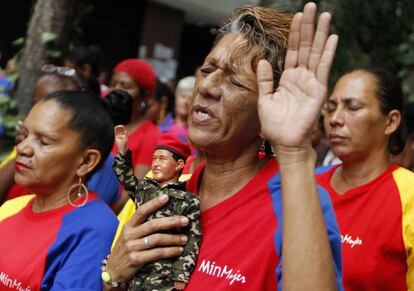Chávez recovers from fourth "difficult" cancer surgery at a Cuban clinic
Venezuelan leader anoints Maduro as successor after rallying support for deputy

Venezuelan President Hugo Chávez was recovering Wednesday at a Cuban clinic after "successfully" undergoing a fourth "difficult" six-hour operation for a cancerous tumor, Vice President Nicolás Maduro announced in a nationwide broadcast.
"The operation is complete, and Commander Chávez is in his room undergoing special treatment carried out by his medical team and experts with the help of other specialists, and experts from our country, who are in Cuba," Maduro said late Tuesday.
In a surprise announcement on Saturday, Chávez told Venezuelans that he would have to undergo another operation just one day after returning from treatment in Havana. He announced the appointment of Maduro as his successor should anything happen to him.
"I decided to come, making an additional effort, in truth, because the pain is not insignificant," Chávez said in his televised address - which was also shown live in Cuba - in which he said that doctors wanted to operate on him right away. "In these circumstances, Nicolás Maduro should not only see out the presidential period, as mandated by the Constitution, but in my firm opinion - which is as clear as the full moon, irrevocable and absolute - if there is a scenario that would mean the calling of presidential elections, you should elect Nicolás Maduro as president," he said.
During the election campaign this year, Chávez told voters that he had been cured.
The type of cancer Chávez is suffering from and the extent of his illness has been kept secret since the Venezuelan leader was first operated on in June 2011.
During the election campaign this year, Chávez told voters that he had been cured. But following his victory in October, giving him a fourth term in power, he was hardly seen in public. A recent three-week absence from the public gaze fueled further speculation about the leftist president's health problems. All Chávez has said is that doctors found malignant cells in his pelvic area.
Venezuelan journalist Nelson Bocaranda, who has been reporting extensively on Chávez's health, said that doctors in Cuba last week told the president that the surgery was a delicate procedure that could cause paralysis in his legs because the cancer was near his spine. The decision to have the operation was entirely up to the president, Bocaranda reported on his website, runrun.es .
Thousands of Chávez's supporters gathered on the streets of Caracas on Tuesday to pray for their ailing leader. Some held up banners and dolls of Chávez dressed in military fatigues as they recited rosaries. As opposed to the past three surgeries, Venezuelans this time were kept abreast of the different stages of the procedure through official government announcements.
Elections will be held if Chávez
Henrique Capriles, who lost the October 7 race to Chávez, wished him a successful recovery.
Ecuadorian President Rafael Correa said he visited with Chávez in Havana last week and said that he was in high spirits.
Under the Venezuelan Constitution, elections will be held if Chávez leaves office during the first four years of his new six-year term. If he leaves during the last two years, Maduro would automatically serve out the remainder of Chávez's term.
The 50-year-old Maduro, a former bus driver who served as foreign minister for the past six years, is considered one of the president's closest advisors. He rose through the ranks after getting his start as an organizer of street rallies during Chávez's imprisonment following the 1992 coup attempt.
"He is a complete revolutionary, a man of great experience despite his youth, with great dedication and capacity for work," Chávez said upon naming him.
Tu suscripción se está usando en otro dispositivo
¿Quieres añadir otro usuario a tu suscripción?
Si continúas leyendo en este dispositivo, no se podrá leer en el otro.
FlechaTu suscripción se está usando en otro dispositivo y solo puedes acceder a EL PAÍS desde un dispositivo a la vez.
Si quieres compartir tu cuenta, cambia tu suscripción a la modalidad Premium, así podrás añadir otro usuario. Cada uno accederá con su propia cuenta de email, lo que os permitirá personalizar vuestra experiencia en EL PAÍS.
¿Tienes una suscripción de empresa? Accede aquí para contratar más cuentas.
En el caso de no saber quién está usando tu cuenta, te recomendamos cambiar tu contraseña aquí.
Si decides continuar compartiendo tu cuenta, este mensaje se mostrará en tu dispositivo y en el de la otra persona que está usando tu cuenta de forma indefinida, afectando a tu experiencia de lectura. Puedes consultar aquí los términos y condiciones de la suscripción digital.








































